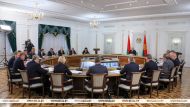MINSK, 21 April (BelTA) - Members of the House of Representatives of the National Assembly of Belarus took part in an inter-parliamentary dialogue on gender-responsive recovery post-COVID-19 “Gender-sensitive parliaments and gender-responsive legal reforms”, BelTA learned.
“The virtual discussion consists of three meetings, each of which covers a specific topic. The first focuses on women's economic empowerment, the second on violence against women and girls. Today's topic touches on such an aspect as promoting gender-sensitive action in parliament. All of these themes stem from the impact of the pandemic. We are well aware that the global coronavirus situation has hit all walks of life. Women are the most vulnerable, and MPs have the task to protect affected women,” said Marina Shkrob, a member of the House of Representatives, a member of the Standing Committee on Healthcare, Physical Culture, Family and Youth Policy.
“There are some industries that have suffered the most, and it is women who work in them. For example, the service sector. The second sensitive part is healthcare, where mostly women work, too. This is less urgent for us than for other countries. We are taking part in this discussion because we cannot disassociate ourselves from global trends and we have to consider to what extent our women are protected. In Belarus, women are absolutely protected by law, so we should work on the practice of application,” the speaker emphasized.
Today's meeting highlighted a number of issues related to the impact of COVID-19 on the promotion of gender equality, experiences and best practices, and legislative and other measures needed to recover from the epidemic.
A UN Women/IPU Handbook for parliamentarians on gender equality in legislation will be produced following three meetings of the Strategic Inter-Parliamentary Dialogue. The handbook aims to help MPs around the world reflect on the importance of repealing existing discriminatory laws, identify practical approaches to introducing more effective and equal legal remedies for men and women, and help MPs identify entry points and best practices for advancing meaningful and timely legislative reform in support of gender equality.













